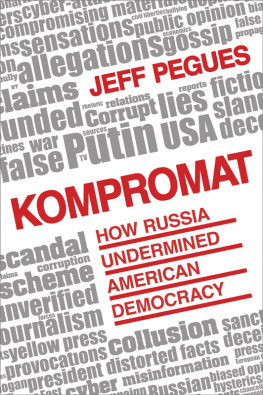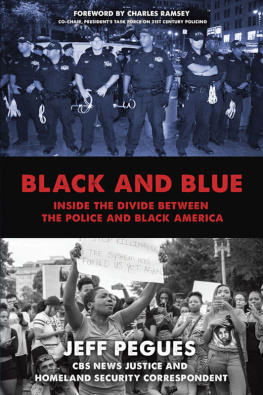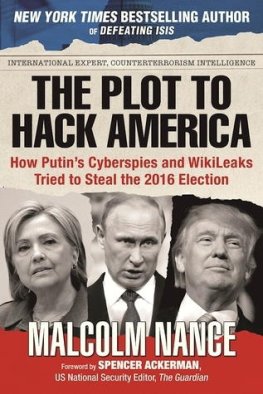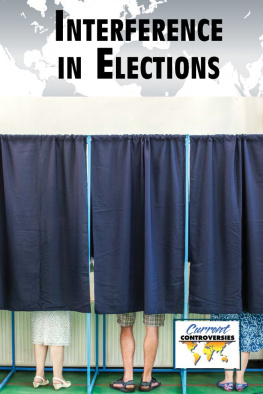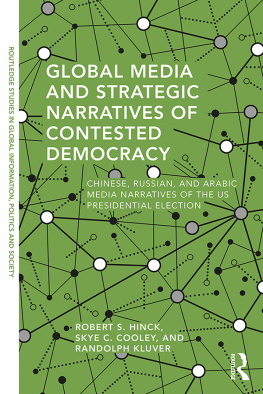
My life has changed dramatically in the last two years. I've authored two books, consistently worked twelve to fourteen hours a day and regrettably missed a lot of important moments at home with my incredible family. I am thankful for the peace, love, and joy they bring to my life in all of this chaos. To my wife, Tareaz, your support means everything to me. I will always need it! To my daughters, Jordyn and Peyton, thank you for working hard in school and playing hard in life! You deserve the best. Also, thanks to Mom and Dad; my big brother, Joseph E. Pegues III; Stephanie Powers Pegues; Gabriel; Zara; Ron; Valerie; Philip; Tiffany; Dorothy Poellnitz; Joseph E. Pegues Sr.; Louise Pegues; Lloyd and Miriam Moore; Stephanie Moore; Ashley Moore; Karen; Celestine; Casey; Carlos; and Morgan.
Thank you, Danielle Wolffe, for your help on this project. Without you this would not have made it to print. You and Kevin Anderson and Associates are difference makers for those of us who need a good editor for projects this big!
To my CBS News family, David Rhodes, Ingrid Ciprian-Matthews, Kim Godwin, Al Ortiz, Laurie Orlando, Steve Capus, Scott Pelley, Norah O'Donnell, Gail King, Jeff Glor, Bob Orr, Ryan Kadro, Diana Miller, Chris Isham, Ward Sloan, Mosheh David Oinounou, Caroline Horn, Albert Oetgen, Chloe Arensberg, Andres Triay, Katie Ross Dominick, Julia Kimani Burnham, Allyson Ross Taylor, Kate Rydell, Mary Walsh, Paula Reid, Duncan McKenna, Grace Lamb Atkinson, Pat Milton, Len Tepper, Julianna Goldman, Alturo Rhymes, Diana Miller, Terri Stewart, Tony Furlow, Caitlin Conant, John Dickerson, Mary Hager, and everyone I wasn't able to mention here who has contributed to my reporting over the years at CBS This Morning, CBS Evening News, Face the Nation, CBSN, and CBS Radio. Thank you all!
Thank you to my friends James Lewis, Eric O'Neill, Erroll Southers, and Frank Cilluffo. Men of knowledge and influence!
My agents, Sharon Chang, Henry Reisch, and Bradley Singer have helped guide my career. Thank you to my friends at Prometheus Books, including Steven L. Mitchell, Jeffrey Curry, Hanna Etu, Jill Maxick, Bruce Carle, Jake Bonar, Amy Vigrass, Lynette Nisbet, Catherine Roberts-Abel, and Jackie Cooke. I also want to acknowledge all of the people who have been on my team for years or decades: Christopher Carmichael, Chuck Murray, Mark Edwards, Gregg Burger, Justin Carmichael, Beth Carmichael, KC, Richard Burns, Elizabeth Murphy Burns, Todd Bloom, Kristin Bloom, JR Rodriguez, Cindy Rodriguez, Ron Hosko, Raoul Davis, Leticia Gomez, MB, Cat McKenzie, Rick Martin, Ducis Rodgers, Shefali Razdan Duggal, Molly Fay, Arles Hendershott, Vince Tirola, Barbara Tirola, Randy Walker, Terry Hoeppner, Shawn Watson, Pat Narduzzi, Gordon Benning, Amoury Hollins, Ron Scott, Miami University president Greg Crawford, Hugh Morgan, Dr. Robert Vogel, Miami University, Miami University football, Laddie Lawrence, Staples High School, Staples High School football, and Staples High School track.

Every effort has been made to provide readers with the latest news about the Russia investigation, but more details are uncovered with each passing day. Please visit my website, jeffpegues.com, to discover the latest information that's come my way since this book was released.

I was sharing a meal of filet mignon and Maker's Mark with an intelligence source. As a journalist I have come to rely on certain sources for details of investigations and frankly potential scandals circulating around government. It is the kind of information that is not readily available to the public. It is often highly classified and not intended for public consumption. At least not until government officials decide to declassify it. The source I was meeting with on that day was a man who had once recounted, with disquieting calm, what it was like to watch the enemy get bombed in war zones by a predator drone. There are live feeds from the armed drones over the battlefield, and you can go to a specially designed enclosed area in a building or Sensitive Compartmented Information Facility or SCIF to see the strike. The Pred feeds, as they've been dubbed by insiders, show the dust settling after the strike while the viewer waits to see how it turned out or the reflectionswhether you have hit the target or not.
That day, as he described the Pred feed to me, my source's voice remained even-keeled. The muscles in his face barely moved. During my career covering the Justice and Homeland Security beat for CBS News, many of the law enforcement and intelligence operatives I've come into contact with spoke of horrible things with this same kind of composure. It's not that they didn't care. They cared. But they were professionals trained to maneuver through emergencies regularly, unnerved. I learned to see their humanity beneath their stoic demeanors. I was getting better at deciphering their cryptic language. So, when these individuals started to panic, I knew something serious was going on.
My source looked me in the eye and casually alluded to problems that he believed were undermining our democracy. He couldn't state any specifics. I knew if I pressed him, he would stop talking to me altogether. He switched the subject to our country's more pressing long-term problem. This was the topic I had become almost exclusively obsessed with since the summer of 2016. I couldn't let it gothe Putin-led cyber-espionage attacks.
So, you are saying this is just the modern-day version of trade craft for the Russians? I asked.
I had been piecing together the evolution of how Russian operatives functioned throughout history. I appreciated the John le Carrlike glamour of the old KGB days in which spies used invisible ink, performed dead letter drops, and buried mounds of cash in the woods.
Then there were the more recent incarnations of Russian-government-led attempts to use our vulnerabilities against us, which spoke to the questions of how any of this stuff affects us directly or why we should care.
In 2016, the internet allowed Russian-government-led cyber-espionage hackers to embed themselves in our institutions, gathering and releasing intelligence to the public to undermine our politicians in a more succinct and effective manner. They attempted to compromise our voting booths and influenced us, without our knowledge, thereby waging an invisible war.
This is warfare. It's not typically discussed in these terms, but the United States and its allies are already engaged in a war with Russia. The hackers messed with our minds by exploiting our divisions with information warfare.
Is it complicated then, because they play by a different set of rules? I asked.
My source nodded. He was silent a long time. He seemed grave. He took a sip of water as I wondered to myself if anybody even knew what those rules were. Several sources had spoken to me about the intricate web of alleged collusion between Russian officials and the Trump administration, which was just one in a series of White Housebased problems they couldn't talk about but had shaken. There was such intensity to them in how they described what had happened.
I kept feeling as if I had been living in a movie or a dream for months. This simultaneously thrilled and frightened me.
It also made me feel an urgent responsibility to uncover more and to relay what I had learned to other people.
Next page
